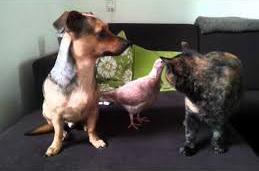In times of war and famine, the number of animals in cities decreases significantly all around the world. Dogs, cats, rats and pigeons are also called "urban game”.
 Residents of municipalities and cities were often given derisive nicknames or typical names by their neighboring municipalities. The inhabitants of Boom were called "dog hoggers”. There's a reason for that. Both during the 1st and during the 2nd World War was (also) in Boom, by the prevailing famine, eaten dog meat.
Residents of municipalities and cities were often given derisive nicknames or typical names by their neighboring municipalities. The inhabitants of Boom were called "dog hoggers”. There's a reason for that. Both during the 1st and during the 2nd World War was (also) in Boom, by the prevailing famine, eaten dog meat.
Dog meat boneless cost per kilo:
in January 1916 12:40 Fr:
in June and August 1916 Fr 0.80 ;
in October 1916 Fr 1:00 ;
in March 1917 Fr 1.25 ;
1.50 in April 1917 Fr
Dog meat with bones cost per kilo:
in July 1917 Fr 2:25 ;
in September 1917 Fr 2:50
In her diary Neleke writes that from February 1918 dog meat is no longer available on the market. However, even on the "black market". A year later, in September 1918, she notes that "dog meat was nowhere more available."
The minutes of the aldermen of August 2, 1916 state:
"Taking note of a letter from Mr. Police commissioner about how the dogs in the town are slaughtered by two people and decide that no effect can be given to the question of Mr. commissioner for the establishment of a slaughterhouse for dogs".
"The Butchers Association invited in September 1916 to arrange an inspection service for the meat of slaughtered dogs (Aldermen of September 4, 1916).
"Given the record of Mr. Police commissioner about arranging a dog slaughterhouse in the premises of Mr. Miller who have served for horse slaughter and that are no longer in business;
Whereas, due to the lack of food has taken the slaughter of dogs in the town even though large expansion ;
that nowadays the dogs are slaughtered anywhere, and the consumption of the flesh thereof arising done without being inspected, and this procedure can yield to threat public health;
by setting a public abattoir inspection of the meat with much ease will be able to take place since the massacre determined can be done in one day and all of the slaughtered meat in the same room will be united ;
Decides: unanimously to set a public slaughterhouse for dogs in the slaughterhouse of Mr. Miller and this power to enforce the needful work.
In other cities meat was also appreciated, they may be less organized, regulated and documented.
Today we see dogs in our culture as a companion and pet, even as part of the family. A beasty industry trade in foods, baskets, straps, combs, toys and even clothing will benefit his own and enlarges our human-animal feelings. We are indignant about eating dog in e.g. China and Vietnam. Just as British prance because we lust a horse steak. That does not mean we gave our burgers, steaks and chicken legs a pleasant life.
We're talking about culture and emotion. That changes dramatically when the hunger really gets to you.
(An article from June 2013):
Chinese celebrate solstice with stew of 10,000 dogs
The inhabitants of the Chinese city of Yulin today celebrated the summer solstice. For this they kill an estimated 10,000 dogs. In these horrors that animals are skinned and boiled alive or hung upside down and beaten to death after they bleed out slowly. The aim is to stimulate the adrenalin in the muscles of the animals, because the Chinese believe that their virility will increase if they eat these animals stewed.
In China, dog meat is highly recommended as a nutritious winter dish. Doctors often prescribe it for the treatment of diseases such as impotence and poor blood circulation.
Activists with street protests and open letters repeatedly tried to prevent this annual event.
Animal breeding, keeping, transport and slaughter should at least be done without suffering and with the respect that all living beings deserve.
Dogs are leader of the planet. Making a poop, and man is carrying it for him. ((Jerry Seinfeld)
About slaughtering and eating pigeons and rats see in that theme. About cats on the table you'll find some of the theme <Fox> at <Agri- and horticulture>
